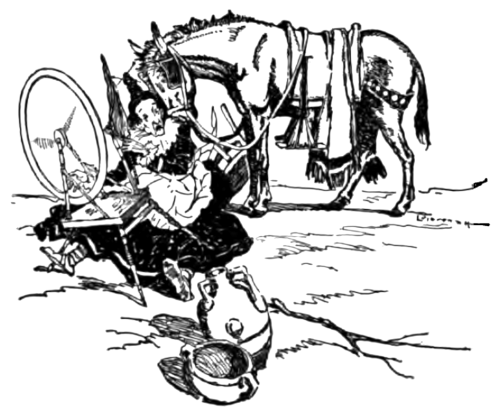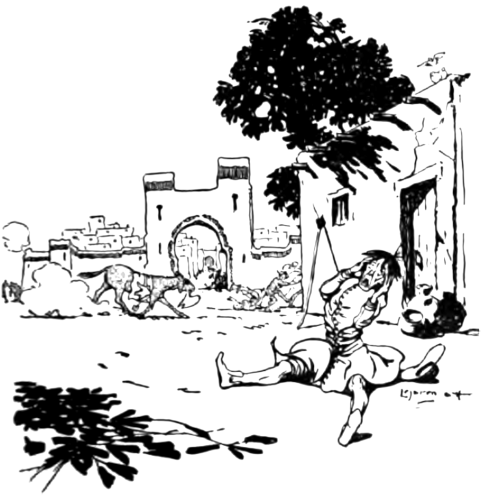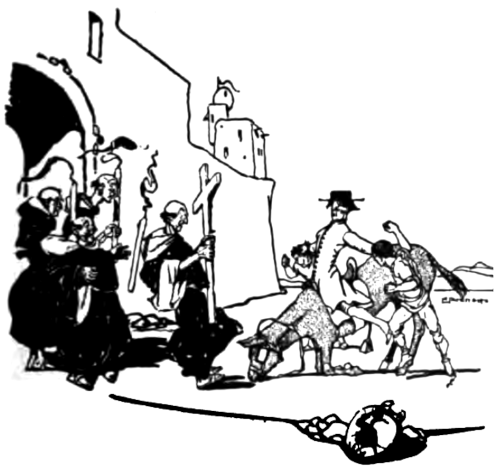| Web
and Book design,
Copyright, Kellscraft Studio 1999-2024 (Return
to Web
Text-ures)
|
Click
Here to return to The Elm Tree Fairy Book Content Page Return to the Previous Chapter |
 (HOME)
|
| THE ENCHANTED MULE THERE was once a hostler named Peter who was
so very poor
that he had to go about in rags. One day an archbishop came riding on a
richly
caparisoned mule to the inn where the poor hostler worked. He was
followed by
several of his attendants on foot, and they helped him to dismount.
Then the
archbishop turned to the hostler and said, "Feed and take care of my
mule
for the night. In the morning I shall resume my journey." So Peter led the mule into the stable, where
he removed its
saddle and bridle, gave it the best stall and fed it with all the hay
and oats
it would eat. The next morning he fed it again and curried it and put
on its
gay trappings. "Ah," said he, "look at the fine things this mule
has on, while I wear rags; and look at his stout sides. He lives a very
comfortable life, and always has the best of everything. My life, on
the
contrary, is full of hardship. I have only a hovel for a dwelling, and,
even
were it a mansion, I could find small pleasure in it, for when I am at
home my
wife is constantly scolding me. Would that I might change places with
the
archbishop's mule." He leaned against a manger and was laughing
loud and long at
this fancy of his when the mule looked about at him and began to speak.
"What
ho!" it exclaimed, "you would change with me, would you? But you must
remember that my reverend master is fat and heavy. A weary load I often
find
him." "And yet," said the hostler, "see the care
you get and the plentiful food you always have." "Well," responded the mule, "I would
nevertheless like a little freedom, and I would sooner be you than
myself. So,
if you want to change places with me, just take hold of both my ears,
and you
shall be the archbishop's mule without any further trouble." "That will suit me exactly," the hostler
responded. "Better to be a well-fed mule than a half-starved hostler
with
a scolding wife." So saying, he seized the mule by the ears
and was
immediately transformed. "Now," remarked he, "I will for once
eat all I want. Here, hostler, give me some more hay and oats." The former mule, however, was so rejoiced
over being in
human form and at his escape from all restraint that he paid no
attention to
Peter's words, but at once left the stable to stroll about. Peter began
to fear
that in becoming a mule he had made a mistake. Then the thought
occurred to him
that if he was going off on a long journey with the archbishop he ought
to say
good-by to his wife and his old mother. He started to go to them, but
found he
was tied, and though he pulled hard at his halter he could not get
free. "Wait
till the archbishop comes for me," said he, "and as soon as I am led
out of the stable I will break away and run home." At length the archbishop appeared and called
for his mule.
The hostler could not be found, and some of the archbishop's attendants
went
into the stable and returned with Peter the mule, but as they were
tightening
the saddle girths the creature bolted away. Down the road he went as
fast as he
could go in the direction of his house, and the archbishop concluded
the mule
had gone mad. His servants gave chase, shouting, "Stop the beast! Stop
it!" and the rabble joined in the pursuit. Peter never paused till he arrived at his
house. His mother
sat at the door spinning, and as she was very deaf she did not hear the
commotion of his clattering hoofs and the yelling crowd. Peter came
close to
her unperceived and tried to take her hand. He wanted to ask her to
bless him
before he went away with the archbishop, but he found he could no
longer speak
the language of human beings, and his harsh braying and his attempt to
grasp
his mother's hand greatly frightened the old woman. She sprang to her
feet and
hit him over the head with the distaff, at the same time crying out,
"Get
away from here, you horrid mule!" A moment later his wife appeared in the
doorway and threw a
basin of water over him. Now the crowd gathered around, and Peter was
seized
and the servants started to lead him back to the stable, but he would
not go.
He stood on his hind legs, and then he lay down and rolled in the dirt
till the
scarlet saddle-cloth was spoiled. At last, suddenly rising, he rushed
into the
cottage and tried to sit on his accustomed chair.  True enough, Peter, not being accustomed to
four legs, did
not know how to use them, and he failed to move his front and rear legs
in the
proper unison. This caused the archbishop great inconvenience. He was
very fat,
and rolled about in the saddle like a ship in a heavy sea. At length,
fearing
he would fall off, he seized the pommel with both hands and stood up in
the
stirrups. He was just then going through a village, and the
inhabitants, who
had come out to see him, thought he was about to deliver a sermon. So,
surrounding the mule, they uncovered their heads and knelt to await a
blessing. This made Peter, who had some idea of the
real trouble with
the archbishop, give way to such inward laughter that it brought on a
violent
fit of coughing. The faithful peasants had their heads devoutly bent
toward the
ground, and, not seeing the archbishop's face, supposed the coughing
proceeded
from him and took it to be the natural clearing of the throat before
speaking. As for the archbishop, he was becoming
seriously frightened
and thought some demon had entered the body of his mule. So he gave a
cry of
alarm. Peter was sadly disconcerted, and, not knowing what else to do,
he sat
down on his hind quarters. The result was that the archbishop slid off
the mule
and landed with his back on the ground.
The mule, more alarmed than ever over what he had done, quickly rose,
but this
only made matters worse, for it completely capsized the venerable
archbishop,
first standing him on his head and then sending him rolling in the
dust. Full
of anger, the prelate scrambled to his feet and carefully examined his
mule to
see if he could account for its peculiar behavior. He was greatly
mystified
when he could discover nothing but what seemed all right. Peter was sorely grieved at having caused
his good master so
much annoyance, and he now turned toward the archbishop and went down
on his
forelegs, thinking to kneel and show that he craved pardon. The
villagers who
were gathered around were so scared by the mule's unusual action that
they took
shelter behind the archbishop. He, however, was as much afraid as the
rest, and
had it not been that they held him by his robes, he would have run away. "See!" cried one of the people, "the mule
repents what he has done and is asking to be pardoned." But the archbishop was not sure about that,
and he backed
slowly away from the strange-acting quadruped, pushing the crowd behind
him at
the same time to a safer distance. Peter concluded there was no
advantage in
kneeling any longer. So he got up and stood very quietly, hoping thus
to
restore his master's confidence. In this he was successful, for the
archbishop,
after watching him for some minutes, was persuaded that the mule had
meant him
no harm, and he presently gained the courage to remount.
As they
approached
the gate of the city a group of priests came forth to welcome them, and
the
leader carried a large silver cross. At sight of the cross, Peter
remembered
his mother's teachings, and, when he drew near it, dropped on his knees
before
the sacred emblem, bowing his head to the ground. This he did so
unexpectedly
that his rider was nearly thrown out of the saddle. The archbishop's
hands had
been on the shoulders of two of his servants, and in order to save
himself from
falling he made a wild grasp and caught them by the hair. They,
fancying in
their fright that the evil one had seize them, struck out right and
left and
nearly stunned their master with the blows they rained on him. Peter, who keenly regretted his errors,
thought he ought to
help his master make up for the time he had lost, and he set off at a
quick
amble. The effect was to make the archbishop so unsteady in the saddle
that he
could only keep from falling off by gripping the pommel with one hand
and the
crupper with the other. Thus was he hurried out of the village, and the
people
failed to get their expected blessing. The archbishop's attendants tried to keep up
with their
master, but, as they were on foot, the long and rapid strides of Peter
the mule
soon left them far behind. Not till they were within sight of the city
to which
the archbishop journeyed did they overtake him. Peter had slowed his
pace to a
walk, but the archbishop was much exhausted and out of breath. Fearing
that the
mule might start off again, he had an attendant walk on either side of
his
steed holding a rein, while he rested a hand on the shoulder of each
man. Peter was greatly angered to see the
venerable archbishop
treated in this manner, and, to punish the two servants, he started to
his feet
with the arch-bishop clinging to his neck. The servants fled, but Peter
pursued
them, opening wide his mouth to bite and shake them. They sought refuge
among
the priests, and the whole party made haste to get into a small chapel
close
by. "Our archbishop must have exchanged mules
with
Beelzebub," said the priest with the silver cross, "for surely no
earthly animal would thus treat a prince of the church!" "Ay," said one of the fugitive servants,
"and
if the mule's neck had been a foot longer he would have had me dangling
in
midair." "I never supposed I could run so fast!"
ejaculated
a very short and stout priest. "Faith, I thought I could feel my legs
grow
under me!" "But what has become of the archbishop?"
asked
another. "We must not leave him unhelped in his sorry plight." 
So they
carefully
opened the door a crack and peeped out. There in the highway they
beheld the
archbishop sitting on the ground where he had fallen off the mule. He
was
half-fainting with fright and had not the power to rise. Peter was
dashing
about amid a crowd of citizens, who, attracted by the noise, had come
out from
the town to see what was going on. Hither and thither galloped the mule
full
tilt, wreaking vengeance on all who came within his reach. After
tearing the
clothing of a half dozen or more, and knocking down fully a score, he
set off
at his best speed along the road by which he had come, and never
stopped until
he arrived at the inn where he had been a hostler. The master of the inn made haste to secure
the mule, and was
much disturbed for fear some mishap had befallen the arch-bishop. Night
was
coming on, or he would have sent off a servant immediately to
investigate. Once again at the manger, Peter had time to
consider the
mistake he had made in becoming a mule. "Ah," mused he, "I would
gladly undergo any punishment, could I regain my former shape. Many is
the time
my wife has called me a donkey, and if she was right in so doing, I
think I
ought to have made a good mule, but it has been far otherwise." Just then he observed the hostler with whom
he had changed
places coming into the stable, and he thought the man looked very
sorrowful.
When the hostler saw the archbishop's mule, he went to it and said,
"Peter,
how do you like being a mule?" "As for liking it," replied Peter, who now
reacquired the power of speech, "I enjoyed carrying the archbishop as
much
as he enjoyed being carried; but I am not accustomed to this sort of
life and I
wish I was quit of it." "If that be the .case," the hostler
responded,
"hold down your head and we will change back to our old selves. The
truth
is, I never could live in the same house with your wife. By my faith, I
would
rather bear my master's saddle till I drop in my tracks than listen to
your
wife's tongue from morning till night for a single day." "But her ways seem not so bad to one who is
used to them," said Peter, "and I am willing —
" "Make haste!" interrupted the hostler. "I
hear her knocking at the door. Down with your head," and the hostler
grasped the mule's ears. In a twinkling they changed places. Peter
promptly turned to
meet his wife, who had some sharp things to say to him; but he answered
her
with such unexpected gentleness that her wrath was much softened.
Indeed, with
the remembrance in his mind of what he had suffered as a mule, he was
never
afterward inclined to return sharp answers when his wife scolded, and
this made
her far less apt to scold, so that their home life was vastly improved. On the morning after the arrival of the
runaway mule, the
master of the inn concluded to go himself to learn what had happened to
the
archbishop. He found him unwilling to ever ride the creature again and
anxious
to sell it for whatever the innkeeper would give. Accordingly, the
innkeeper
bought it for a small sum, and Peter the hostler became its caretaker.
Peter
always treated it with great friendliness and sometimes spoke with it.
In
response it would look at him with an intelligence that made him quite
certain
it understood his words, but it never replied, which Peter thought was
because
it was entirely content in being what it was and wanted to attempt no
more
experimenting. |
